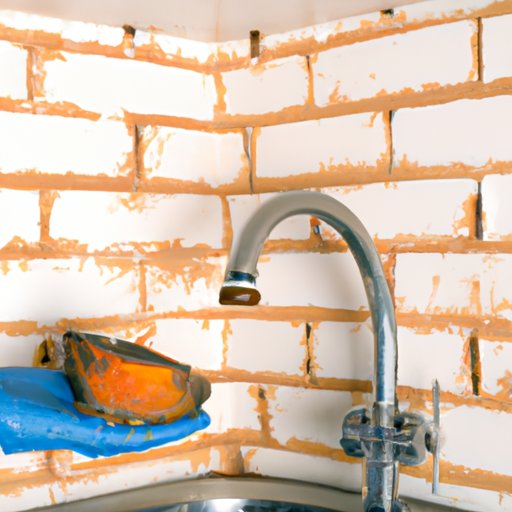Introduction
Mineral deposits are accumulations of minerals that form when water evaporates, leaving behind the residues of dissolved minerals. Mineral deposits can be a problem in homes as they can cause clogging, discoloration, and damage to appliances and surfaces. Cleaning mineral deposits is important to maintain the cleanliness, safety, and longevity of your home and belongings.
Removing Mineral Deposits: Effective Tips and Tricks
Regular cleaning is essential to prevent mineral deposits from building up and causing damage. You will need a few materials to get started: a scraper, a stiff-bristled brush, a cloth, white vinegar, baking soda, and lemon juice. Be sure to wear protective gear such as gloves and goggles to avoid chemical exposure.
First, scrape off any large mineral deposits using a scraper. Next, use a stiff-bristled brush to scrub the surface with a mixture of white vinegar and water. Rinse the area with clean water and dry with a cloth. For stubborn stains, make a paste with baking soda and water and apply it to the affected area. Leave the paste for a few hours, then rinse and dry. To remove rust stains, soak the object in lemon juice and then scrub with a brush.
Say Goodbye to Hard Water Stains: The Ultimate Guide to Cleaning Mineral Deposits
Hard water stains are a common type of mineral deposit that can be found on showerheads, faucets, and glass surfaces. To remove hard water stains, you will need vinegar, a clean cloth, and a plastic bag. First, apply a generous amount of vinegar on the affected area and allow it to soak for a few hours. Next, wrap the area with a plastic bag and secure it with tape. Leave the bag on for a few more hours. Finally, remove the bag and wipe the surface with a cloth.
Natural Remedies for Mineral Deposit Removal
Natural remedies are a great option for removing mineral deposits as they are safe, non-toxic, and eco-friendly. Some natural products that can be used to clean mineral deposits include vinegar, lemon juice, baking soda, borax, and salt. To clean mineral deposits with natural remedies, mix the product with water to form a paste or solution. Apply the paste to the affected area and scrub with a brush. Rinse thoroughly with water and dry the surface with a clean cloth.
Mastering the Art of Cleaning Mineral Deposits: Step-by-Step Instructions and Techniques
The techniques for cleaning mineral deposits depend on the type of surface and the severity of the stains. For example, to clean a toilet bowl, you can use vinegar or borax mixed with water. Pour the solution into the bowl and let it sit for a few hours. Scrub the bowl with a brush and then flush. To clean a coffee maker, run a cycle of white vinegar mixed with water through the machine. Rinse the machine with clean water and run another cycle with water only. For showerheads, remove the head and soak it in vinegar overnight. Rinse the head with clean water and reattach it to the shower.
DIY Solutions for Cleaning Mineral Deposits Without Harsh Chemicals
DIY solutions are a great way to clean mineral deposits without harsh chemicals. To clean a showerhead, mix equal parts of vinegar and baking soda in a plastic bag. Place the bag over the head and secure it with a rubber band. Leave the bag on for a few hours and then rinse with clean water. To clean a faucet, make a paste with baking soda and water and apply it to the spout. Scrub with a brush and rinse with water.
Conclusion
Cleaning mineral deposits is essential to maintain the cleanliness, safety, and longevity of your home and belongings. Regular cleaning, natural remedies, and DIY solutions can help remove mineral deposits effectively and safely. Remember to always wear protective gear and follow safety precautions when cleaning mineral deposits. With these tips and tricks, you can say goodbye to mineral deposits and hello to a clean and healthy home.
(Note: Is this article not meeting your expectations? Do you have knowledge or insights to share? Unlock new opportunities and expand your reach by joining our authors team. Click Registration to join us and share your expertise with our readers.)
